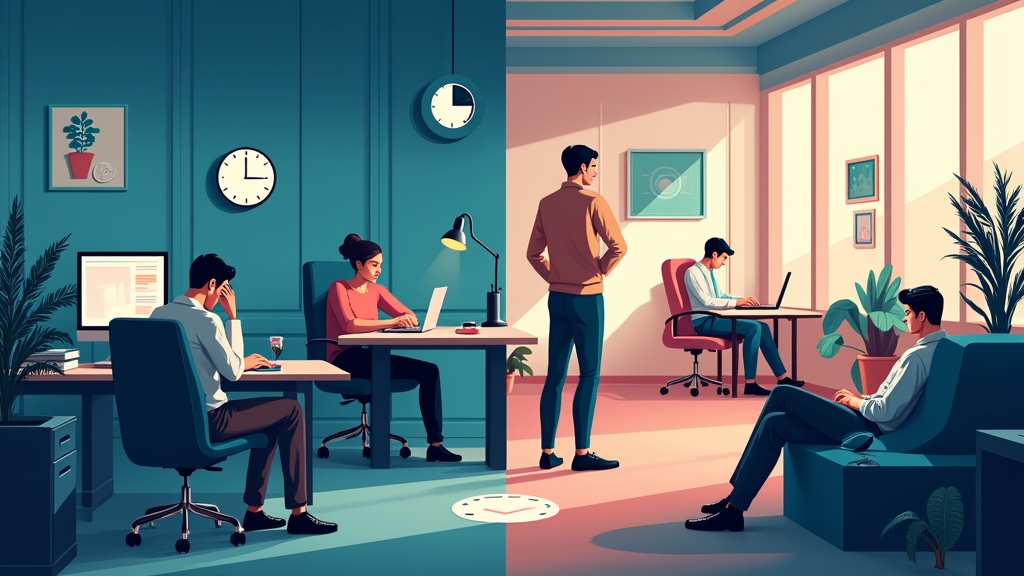Advertising
The Rise of the Fatigue Economy: When Exhaustion Became Currency
Have you ever felt that, even after a full day's work, you still have an endless to-do list? Or that rest seems like a distant luxury? This is not an isolated phenomenon. We live in the age of fatigue economya term coined by philosopher Byung-Chul Han to describe a society where extreme productivity and self-exploitation are glorified. The job market, far from being immune to this, is being profoundly transformed. Companies and employees are rethinking hiring models, management and even the value of free time.
But how did we get here? The answer lies in the combination of factors such as hyperconnectivity, the "always on" culture and the pressure for immediate results. Digital platforms and productivity tools, instead of making life easier, often increase the mental burden. A study by World Health Organization reveals that 15% of working-age adults suffer from work-related mental disorders.
What does this mean for companies? Some have realized that exhausted employees are less creative, more prone to mistakes and, of course, more likely to resign. Big names like MicrosoftIn a recent study, they tested four-day weeks and reported a 40% increase in productivity. Could fewer hours mean more results?
Here we need to reflect: if tiredness is the new normal, how can organizations adapt to retain talent and maintain the mental health of their staff? The answer may lie in rethinking not just the workload, but the structure of work itself.
Exhaustion as a Symptom of a Sick System
It's no exaggeration to say that many of us are operating in "autopilot" mode. Exhaustion is no longer a temporary state, but a chronic condition. And what's worse? It is often disguised as "resilience" or "dedication". How many times have you heard phrases like "no risk, no gain"?
The problem is that this narrative ignores a crucial fact: exhaustion has costs. For the individual, it means burnout, anxiety and even physical illness. For companies, it means absenteeism, turnover and loss of institutional knowledge. A report by Gallup shows that only 21% of global employees feel engaged at work.
But how can you tell if your team is on edge? Signs such as excessive procrastination, irritability and a drop in the quality of work are red flags. Companies like Spotify adopted policies of "mental health days" - extra days off for emotional recovery, without the need for justification.
Have you ever stopped to assess whether your team is really doing well or just "getting by"? Change begins when leaders understand that productivity is not synonymous with hours worked, but with sustainable energy.
New Forms of Contracting: Flexibility as a Rule, Not an Exception
If the traditional working model is failing, how are companies attracting talent? The answer lies in radical flexibility. Home office, personalized schedules and even project-based contracts are becoming standard in innovative sectors.
One example is AutomatticThe company behind WordPress has been operating 100% remotely since 2005. Its employees can work from anywhere, at any time, as long as they deliver results. The model proves that trust generates reciprocity: the company's retention rate is 20% above the market average.
But what about more traditional sectors? Even industries like manufacturing are experimenting with smaller scales. In Volvofactories in Sweden adopted six-hour shifts without wage cuts - and production remained stable.
The question remains: why resist changes that benefit everyone? Perhaps because there is still a myth that "idle people are unproductive". But what if, in fact, idleness is essential for creativity?

Management by Results: The End of Presenteeism
How many unnecessary meetings have you attended just to "show your service"? This is called presenteeism - the culture of valuing physical presence over real contribution. Fortunately, many companies are abandoning this practice in favor of management by results.
A LinkedInFor example, it has eliminated the requirement to attend the office every day. Instead, it measures performance through clear targets and continuous feedback. The result? A 25% increase in employee satisfaction.
But how do you implement this change without losing control? Tools such as OKRs (Objectives and Key Results) and 360° evaluations help to keep the focus on what matters. The key is transparencyeveryone must understand how their work impacts the whole.
Would you rather be judged by how many hours you spent in the office or by what you actually delivered? The answer could define the future of your workplace.
Downtime as a Corporate Benefit: Why Unplugging is Productive
You know that coffee break that seems like a waste of time? Actually, it's a investment. Studies of Harvard Business Review show that regular intervals improve decision-making by up to 50%.
Companies like Airbnb offer "wellness credits" for employees to spend on massages, therapy or even travel. The logic is simple: rested people are more creative and loyal.
But what if your company doesn't have the resources for luxurious benefits? Small actions already make a difference. Allowing unmonitored breaks, encouraging hobbies and turning off after-hours communications are simple steps.
Imagine a world where free time is not a privilege, but part of the process. Wouldn't it be easier to innovate and collaborate?
The Future of Work: Less Tired, More Meaningful
The economy of tiredness is not inevitable. It is a reflection of choices - and it can be deconstructed. The job market of the future will not be about who can take more, but about who creates environments where people thrive.
Are you ready to be part of this change? Start today: evaluate your routine, talk to your team, try out small adaptations. It's a long road, but every step counts.
And if you still have doubts, remember: even machines need maintenance. Why should we be any different?



